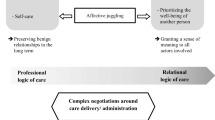Abstract
The literature on organizational ethics has paved the way for a situated and intersubjective understanding of ethics through caring practices. In this article, we try to extend this perspective by looking beyond the interactions of caregivers among themselves or with care seekers to reveal ethics as the ongoing collective accomplishment of a variety of actors. We do so by mobilizing Strauss’s theoretical perspective of articulation work in the context of healthcare. Based on an ethnography, we show how actors of care (e.g., nurses, caregivers, or doctors) operate within care arrangements that need to be frequently rearticulated to face ethical threats and protect their patients’ well-being. We distinguish three types of rearticulation corresponding to different degrees of rearticulation, individual actor stance, and specific ways of working things out. We discuss their implications for the maintenance of organizational ethics.

Similar content being viewed by others
Notes
However, although the physicians were not the hierarchical superiors of the paramedics (in contrast to the health executive), they nevertheless exercised their authority over the latter, if only because they established the medical prescriptions.
Insofar as these two trajectories are being “disarticulated” incessantly, they allow us to observe the collective work of caregiver rearticulation on the spot.
Although the functional unit in which we conducted our observations was not a palliative care unit, it could nevertheless accommodate people at end of life. In this 36-bed unit, there were always at least two or three beds reserved for people at the end of life. The situations of Ms. D1 and D2 are therefore not exceptional, but representative of a certain type of trajectory, what Strauss calls “end-of-life” and/or “death” trajectories (death being understood by Strauss as a process).
Following the visit of the palliative care specialists to the department. On this occasion, it was decided to stop tube feeding and reduce the amount of care provided.
This does not mean, of course, that we condone these resource-constrained environments, quite the contrary.
From an ethical point of view, we should clearly distinguish between what happens in interactions with the patient—where ethics in dialog means respect for the individual and, therefore, for the rules of politeness and decorum—and what goes on and is said behind the scenes, between colleagues, which is not intended to be heard by patients or families.
References
Baines, D., Dulhunty, A., & Charlesworth, S. (2021). Relationship-based care work, Austerity and aged care. Work, Employment and Society, 095001702098098
Clegg, S., Kornberger, M., & Rhodes, C. (2007). Business ethics as practice. British Journal of Management, 18(2), 107–122.
Cooke, H. A., & Baumbusch, J. (2021). Residential care aides’ experiences of workplace incivility in long-term care (p. 095001702097731). Employment and Society.
Corbin, J. M., & Strauss, A. L. (1993). The articulation of work through interaction. The Sociological Quarterly, 34(1), 71–83.
Dashtipour, P., & Vidaillet, B. (2017). Work as affective experience: The contribution of Christophe Dejours’ ‘psychodynamics of work.’ Organization, 24(1), 18–35.
Eaton, S. C. (2000). Beyond ‘unloving care’: Linking human resource management and patient care quality in nursing homes. The International Journal of Human Resource Management, 11(3), 591–616.
Edwards, M., Gattrell, C., & Sutton, A. (2023). The case for parentalism at work: Balancing feminist care ethic and justice ethics through a winnicottian approach: A school case study. Journal of Business Ethics. https://doi.org/10.1007/s10551-023-05352
Fotaki, M., Islam, G., & Antoni, A. (2019). The contested notions and meaning of care: An overview. In M. Fotaki, G. Islam, & A. Antoni (Eds.), Business ethics and care in organizations (pp. 3–21). Routledge.
Gioia, D.A., Corley, K.G., & Hamilton, A.L. (2013). Seeking Qualitative Rigor in Inductive Research: Notes on the Gioia Methodology. Organizational Research Methods, 16(1), 15–31.
Gherardi, S., & Rodeschini, G. (2016). Caring as a collective knowledgeable doing: About concern and being concerned. Management Learning, 47(3), 266–284.
Gilligan, C. (1993). In a different voice: Psychological theory and women’s development. Harvard university press.
Goffman, E. (1959). The presentation of self in everyday life. Anchor Book, NY, 259.
Grosjean, M., & Lacoste, M. (1999). Communication et intelligence collective. Presses Universitaires de France.
Hancock, P. (2008). Embodied generosity and an ethics of organization. Organization Studies, 29(10), 1357–1373.
Held, V. (2006). The ethics of care: personal, political (p. 211p). Oxford University Press.
Hester, H. (2018). Care under capitalism: The crisis of “women’s work.” IPPR Progressive Review, 24(4), 343–352.
Kahn, W. A. (1993). Caring for the caregivers: Patterns of organizational caregiving. Administrative Science Quarterly, 38(4), 539.
Kellogg, K. C. (2009). Operating room: Relational spaces and microinstitutional change in surgery. American Journal of Sociology, 56, 657.
Lawrence, T. B., & Maitlis, S. (2012). Care and possibility: Enacting an ethic of care through narrative practice. Academy of Management Review, 37(4), 641–663.
Lazarus, R. S., & Folkman, S. (1984). Stress, appraisal, and coping. Springer publishing company.
Li, Y.-T., & Ng, J. (2021). Moral dilemma of striking: A medical worker’s response to job duty, public health protection and the politicization of strikes. Work, Employment and Society, 36, 967.
Loacker, B., & Muhr, S. L. (2009). How can I become a responsible subject? Towards a practice-based ethics of responsiveness. Journal of Business Ethics, 90(2), 265–277.
Lunkka, N., Jansson, N., Mainela, T., Suhonen, M., Meriläinen, M., Puhakka, V., & Wiik, H. (2022). Professional boundaries in action: Using reflective spaces for boundary work to incorporate a new healthcare role. Human Relations, 75(7), 1270–1297.
Mandalaki, E., & Fotaki, M. (2020). The bodies of the commons: Towards a relational embodied ethics of the commons. Journal of Business Ethics, 166(4), 745–760.
McCann, L., Granter, E., Hassard, J., & Hyde, P. (2015). “You can’t do both-something will give”: Limitations of the targets culture in managing UK health care workforces. Human Resource Management, 54(5), 773–791.
Molterer, K., & Hoyer, P. (2019). A serious matter: Clowning as an ethical care practice. In M. Fotaki, G. Islam, & A. Antoni (Eds.), Business ethics and care in organizations (pp. 106–124). Routledge.
Molterer, K., Hoyer, P., & Steyaert, C. (2020). A Practical ethics of care: Tinkering with different ‘goods’ in residential nursing homes. Journal of Business Ethics, 165(1), 95–111.
Morgan, P. I., & Ogbonna, E. (2008). Subcultural dynamics in transformation: A multi-perspective study of healthcare professionals. Human Relations, 61(1), 39–65.
Mumford, C., Holman, D., McCann, L., Nagington, M., & Dunn, L. (2020). Enacting care amid power relations: The role of ‘veiled care’ in organizational life. Organization, 29, 577.
Newman, S., & Lawler, J. (2009). Managing health care under New Public Management: A Sisyphean challenge for nursing. Journal of Sociology, 45(4), 419–432.
Nielsen, R. P. (2010). Practitioner-based theory building in organizational ethics. Journal of Business Ethics, 93(3), 401–406.
Nizet, J., Fatien Diochon, P., & Balachandran Nair, L. (2021). When commitments conflict: Making ethical decisions like a funambulist. Management. https://doi.org/10.37725/mgmt.v24i1.4497
Pérezts, M., Bouilloud, J.-P., & de Gaulejac, V. (2011). Serving two masters: The contradictory organization as an ethical challenge for managerial responsibility. Journal of Business Ethics, 101(1), 33–44.
Pérezts, M., Faÿ, E., & Picard, S. (2015). Ethics, embodied life and esprit de corps: An ethnographic study with anti-money laundering analysts. Organization, 22(2), 217–234.
Pérezts, M., & Picard, S. (2015). Compliance or comfort zone? The work of embedded ethics in performing regulation. Journal of Business Ethics, 131(4), 833–852.
Pullen, A., & Rhodes, C. (2014). Corporeal ethics and the politics of resistance in organizations. Organization, 21(6), 782–796.
Puyou, F.-R., & Faÿ, E. (2015). Cogs in the wheel or spanners in the works? A phenomenological approach to the difficulty and meaning of ethical work for financial controllers. Journal of Business Ethics, 128(4), 863–876.
Simola, S. (2012). Exploring “embodied care” in relation to social sustainability. Journal of Business Ethics, 107(4), 473–484.
Simonet, D. (2015). The new public management theory in the British health care system: A critical review. Administration & Society, 47(7), 802–826.
Strauss, A. (1985). Work and the division of labor. The Sociological Quarterly, 26(1), 1–19.
Strauss, A. (1988). The articulation of project work: An organizational process. The Sociological Quarterly, 29(2), 163–178.
Strauss, A., Fagerhaugh, S., Suczek, B., & Wiener, C. (1985). Social organization of medical work. University of Chicago Press.
Strauss, A., Schatzman, L., Bucher, R., Ehrlich, D., & Sabshin, M. (1963). The hospital audits negotiated order. In E. Freidson (Ed.), The hospital in modern society (pp. 147–169). The Free Press.
Townsend, K., & Wilkinson, A. (2010). Managing under pressure: HRM in hospitals. Human Resource Management Journal, 20(4), 332–338.
Tronto, J. C. (2010). Creating caring institutions: Politics, plurality, and purpose. Ethics and Social Welfare, 4(2), 158–171.
Varcoe, C., Doane, G., Pauly, B., Rodney, P., Storch, J. L., Mahoney, K., et al. (2004). Ethical practice in nursing: Working the in-betweens. Journal of Advanced Nursing, 45(3), 316–325.
Vasquez, C., Brummans, B., & Groleau, C. (2012). Notes from the field on organizational shadowing as framing. Qualitative Research in Organizations and Management: An International Journal, 7(2), 144–165.
Wilhelm, H., Bullinger, B., & Chromik, J. (2020). White Coats at the Coalface: The Standardizing Work of Professionals at the Frontline. Organization Studies, 41(8), 1169–1200
Willis, E., Carryer, J., Harvey, C., Pearson, M., & Henderson, J. (2017). Austerity, new public management and missed nursing care in Australia and New Zealand. Journal of Advanced Nursing, 73, 3102–3110.
Wright, A. L., Irving, G., & Selvan Thevatas, K. (2020). Professional values and managerialist practices: Values work by nurses in the emergency department. Organization Studies, 42, 1435.
Acknowledgements
We would like to thank all the members of the geriatric operational unit in which the ethnographic survey was carried out (orderlies, nurses, doctors and health executive). The article also benefited from a paper development workshop in December 22, and a writing seminar held in Avignon in June 23 (both organized by Neoma Future of Work Area). Jane MacKinnon was very helpful in revising our ideas and refining the expression. Finally, we would like to thank the editor and the two anonymous reviewers for their support and constructive comments on early drafts of the document.
Author information
Authors and Affiliations
Corresponding author
Ethics declarations
Conflict of interest
All authors certify that they have no affiliations with or involvement in any organization or entity with any financial interest or non-financial interest in the subject matter or materials discussed in this manuscript.
Informed Consent
Informed consent was obtained from all individual participants included in the study.
Research Involving Human and Animal Rights
Before conducting the observation, the second author exposed his project to and received an agreement from the head of the hospital service. After having observed the service, he presented a diagnosis report to a research monitoring committee, constituted of representatives of the service (orderlies, nurses and doctors). They provided him with their feedbacks, which he took into consideration to amend his report, until a shared diagnosis was reached. As for the ethical approval from their respective institutions, none of the authors’ had an ethic committee when the research project was undertaken, nor were in capacity to provide them with ethical approval.
Additional information
Publisher's Note
Springer Nature remains neutral with regard to jurisdictional claims in published maps and institutional affiliations.
Rights and permissions
Springer Nature or its licensor (e.g. a society or other partner) holds exclusive rights to this article under a publishing agreement with the author(s) or other rightsholder(s); author self-archiving of the accepted manuscript version of this article is solely governed by the terms of such publishing agreement and applicable law.
About this article
Cite this article
Suquet, JB., Collard, D. Maintaining “Good” Care: An Articulation Work Perspective on Organizational Ethics in the Healthcare Sector. J Bus Ethics (2024). https://doi.org/10.1007/s10551-024-05616-z
Received:
Accepted:
Published:
DOI: https://doi.org/10.1007/s10551-024-05616-z




